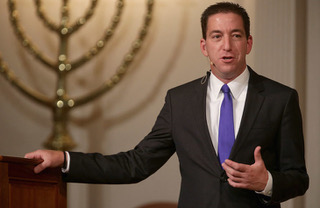Why Glenn Greenwald backs Putin
Few things are sure in life: death, taxes and Glenn Greenwald advocating whatever position happens to be in the interests of Vladimir Putin

Few things are sure in life: death, taxes and Glenn Greenwald advocating whatever position happens to be in the interests of Vladimir Putin. The self-styled civil libertarian rose to prominence during the George W. Bush administration for his withering attacks on American counterterrorism policies. Later, he won a Pulitzer Prize for his role in facilitating Edward Snowden’s leak of government documents. Always a rancorous figure who bristled at attempts to place him in a partisan box, Greenwald started to upset his confederates on the left and develop a fan base on the right during the Trump years.
Greenwald was one of the most vocal critics of the narrative positing that the new American president was a pawn of the Russian one. From his jungle hideout in Brazil, Greenwald became a regular presence on Fox News, whose primetime hosts reveled in having an openly gay, avowedly anti-imperialist firebrand skewer the Democratic Party and its mainstream media echo chamber. More recently, as Russia amassed over 100,000 troops on Ukraine’s border, Greenwald attracted more admirers on the isolationist right by blaming the Biden administration and its NATO allies for “provoking” the conflict.
“What is the US interest in Ukraine?” Greenwald asked Laura Ingraham. “Why do Americans care at least enough to spend huge sums of money, unlimited money to go to war with Russia or even by proxy, to defend the territorial boundaries of Ukraine?”
No one is seriously suggesting that the United States “go to war with Russia” over Ukraine. Presenting the policy options facing the West right now as a binary choice between outright appeasement and nuclear holocaust is a tried and true tactic of Russian apparatchiks and their Western sympathizers dating back to the Cold War. “Better red than dead,” as the latter used to say.
It is not difficult to discern the national interest in defending Ukraine’s territorial integrity from a revanchist Russia. Back in 2014, when Russia annexed the Crimean peninsula in the first armed seizure of territory on the European continent since World War Two, it did so on the false pretext that the Ukrainian government was oppressing Russian-speakers. This was the same form of cynical reasoning that Adolf Hitler cited in his absorption of the Sudetenland in 1938, deluding Neville Chamberlain with stories of ethnic Germans being slaughtered in their sleep by their Czechoslovakian overlords.
“Why do I care about the borders of Ukraine at least enough to risk American treasure, when we have so many problems at home?” Greenwald moans. It would be impossible to make Greenwald care about the fate of vulnerable democracies threatened by the rapacious despotisms for which he shills. But for those whose political worldview has progressed beyond adolescent anti-Americanism, it should be obvious why the civilized world has a stake in preventing dictatorships from changing national boundaries by force.
It is one thing to say that the West should do whatever it takes to avoid conflict with Russia over a territorial dispute between people about whom we know nothing, even if it means letting Putin gobble up more of Ukraine. Dogmatically arguing the case of America’s enemies, however, as Greenwald does, inevitably leads to blaming the victim. “I know we’re not supposed to think this way,” Greenwald recently tweeted, his every utterance a courageous intervention against the Powers That Be, “but imagine if members of the Russian Parliament went to Cuba or Mexico or Bolivia and boasted that they were arming groups there to fight the US, then returned to Moscow and claimed it was the US interfering and acting provocatively.”
Appearing last year on Tucker Carlson’s show while the Russian military conducted a large exercise along the Ukrainian border (a move far more “provocative” than anything the US has done in the region), Greenwald insisted that “all you have to do is look at a map or history of how Russia was almost twice destroyed in the twentieth century to see the crucial importance of Ukraine to Russia.”
Unlike Russia in Eastern Europe, the United States is not threatening any country in the Western hemisphere with a military invasion, never mind annexation. Nor is NATO, a defensive alliance, in any way like Wilhelmine or Nazi Germany — the outrageous moral equivalence Greenwald aims to establish by referring to Russia’s near-destruction in the twentieth century.
During this era of dramatic political realignment, Greenwald should at least be credited for consistency. In 2012, when Republican presidential candidate Mitt Romney termed Moscow America’s “number one geopolitical foe,” Barack Obama smugly retorted that “The 1980s are now calling to ask for their foreign policy back,” and Democrats laughed haughtily. A few years later, when Trump descended onto the political scene with his shady Russian connections and warm words for Putin, many of these same people exchanged their ostensibly enlightened opposition to Manichean Cold War thinking for McCarthyite paranoia. On the other side of the aisle, a depressing number of conservatives, eager to imitate their new leader’s bizarre admiration for a Russian dictator, started sounding like the ghosts of Beatrice and Sidney Webb.
“What happened to Glenn Greenwald?” ask his erstwhile allies on the left, who bewilderingly utter the same question about anyone who dares stray from the party line. Greenwald is not, as many of his critics lazily allege, a Russian agent; that would imply that his motivation is pecuniary rather than heartfelt. Greenwald remains what he has always been: a sincere enemy of liberal democracy and a genuine lickspittle for tyrants.
This article was originally published in The Spectator’s March 2022 World edition.
